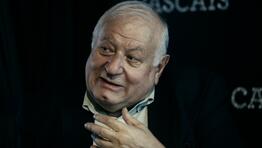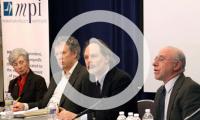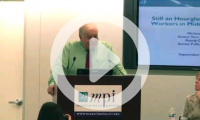Demetrios G. Papademetriou
Demetrios G. Papademetriou was a Distinguished Transatlantic Fellow at the Migration Policy Institute, which he co-founded and led as its first President until 2014 and where he remained President Emeritus until his death in January 2022. He served until 2018 as the founding President of MPI Europe, a nonprofit, independent research institute in Brussels that aims to promote a better understanding of migration trends and effects within Europe.
He was the convener of the Transatlantic Council on Migration, which is composed of senior public figures, business leaders, and public intellectuals from Europe, the United States, Canada, and Australia. He also convened the Regional Migration Study Group in 2011–15, an initiative that has proposed and is promoting multi-stakeholder support for new regional and collaborative approaches to migration, competitiveness, and human-capital development for the United States, Canada, Mexico, and Central America.
Dr. Papademetriou co-founded Metropolis: An International Forum for Research and Policy on Migration and Cities (which he led as International Chair for the initiative’s first five years and where he continued to serve as International Chair Emeritus); and served as Chair of the World Economic Forum's Global Agenda Council on Migration (2009-11); Founding Chair of the Advisory Board of the Open Society Foundations' International Migration Initiative (2010-15); Chair of the Migration Group of the Organization for Economic Cooperation and Development (OECD); Director for Immigration Policy and Research at the U.S. Department of Labor and Chair of the Secretary of Labor's Immigration Policy Task Force; and Executive Editor of the International Migration Review.
He published more than 275 books, articles, monographs, and research reports on a wide array of migration topics, lectured widely on all aspects of immigration and immigrant integration policy, and advised foundations and other grant-making organizations, civil-society groups, and senior government and political party officials, in dozens of countries (including numerous European Union Member States while they hold the rotating EU presidency).
Dr. Papademetriou held a PhD in comparative public policy and international relations (1976) from the University of Maryland and taught at the universities of Maryland, Duke, American, and New School for Social Research.
Bio Page Tabs
This Migration Policy Institute event was held to discuss the release of MPI's book, Migration and the Great Recession: The Transatlantic Experience, which reviews how the financial and economic crisis of the late 2000s marked a sudden and dramatic interruption in international migration trends.
In a report by MPI's Labor Markets Initiative, noted economist and Georgetown University Public Policy Institute Professor Harry J. Holzer examines the economic reasoning and research on these questions and looks at the policy options that shape the impact of less-skilled immigration on the economy. The discussion is on what policy reform would best serve native-born American workers, consumers, and employers, as well as the overall U.S. economy.
This important MPI report challenges the conventional wisdom about the immigrant workforce, using a sophisticated new method of analysis that permits deeper examination of how workers – immigrant and native-born – fare by economic sector, the skill level of their jobs, and educational attainment.
UN Deputy High Commissioner for Refugees T. Alexander Aleinikoff offers remarks on durable solutions for the refugee protection system as part of MPI's Leadership Visions Series.
Pages
Recent Activity
La migración ha contribuido a dar forma y definir las relaciones entre Estados Unidos y México desde hace más de un siglo, y las relaciones con Centroamérica aproximadamente durante los últimos 30 años. A veces, incluso la migración se convierte en la lente a través de la cual se consideran todos los otros aspectos de esta relación.
This MPI event discussed the Dutch model for fighting human trafficking and the strategic and operational dilemmas that public prosecutors in the Netherlands face.
The current U.S. legal immigration system includes few visas for low-skilled workers, and employers have relied heavily on an unauthorized workforce in many low-skilled occupations. This issue brief explains the questions that policymakers must grapple with when designing programs for admission of low-skill workers, for temporary as well as permanent entry. The brief focuses in part on the recent agreement by the U.S. Chamber of Commerce and AFL-CIO regarding admission of future low-skilled workers.
With the prospects for immigration reform greater than they have been in more than a decade and the U.S. economy slowly shrugging off the effects of the recession, the United States may be on the cusp of historic changes that make the immigration system a more effective tool for innovation, economic growth and the competitiveness of its firms—large and small.















![EVENT%20PHOTO%202011.6.13%20Recession1web[1]](https://www.migrationpolicyinstitute-europe.com/sites/default/files/styles/multimedia_slider_overlay_audio/public/media_images/EVENT%2520PHOTO%25202011.6.13%2520Recession1web[1].jpg?itok=EIHwQ8Dh)


The Migration Crisis Is Over: Long Live the Migration Crisis
The Dutch Elections: How to Lose and Still Shape the Direction of a Country—and Possibly a Continent?
Global Refugee Summits Offer Reasons for Both Disappointment and Hope
The Field of Migration Studies Loses a Giant: Graeme Hugo